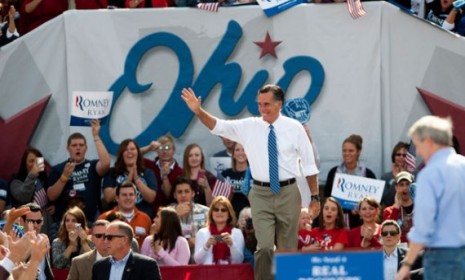Why Mitt Romney is catching up in Ohio
President Obama's big lead has dwindled in the swing state considered most likely to tip the election. What changed?

With just two weeks left in the campaign, President Obama and Mitt Romney are airing a final wave of TV ads in the nine battleground states expected to decide the November election. And nowhere is the fight more intense than in Ohio, the only state to have sided with the winner in all of the last 12 presidential elections. Ohio "is the embodiment of Middle America," says Albert Hunt at Bloomberg News, "and swings back and forth from Republican red to Democratic blue. Right now it looks bluish purple." Obama held a comfortable lead until early October, when his GOP challenger surged in popularity after winning the first of three presidential debates. According to the latest poll, released by Public Policy Polling on Saturday, Obama's lead has dwindled to a single percentage point. How did Romney catch up? Here, four theories:
1. Ohioans like Romney's softer image
"A rehabilitated personal image" seems to be driving Romney's gains in the Buckeye State, says Tom Kludt at Talking Points Memo. The former Massachusetts governor was unpopular in Ohio for much of the campaign, thanks to "relentless scrutiny" of his professional past and his opposition to an auto bailout that saved thousands of Ohio jobs. Romney launched a push to soften his personal and political image, however, starting with his nominating convention, and now 49 percent of the state's voters have a favorable opinion of him, while 47 percent maintain a negative one.
The Week
Escape your echo chamber. Get the facts behind the news, plus analysis from multiple perspectives.

Sign up for The Week's Free Newsletters
From our morning news briefing to a weekly Good News Newsletter, get the best of The Week delivered directly to your inbox.
From our morning news briefing to a weekly Good News Newsletter, get the best of The Week delivered directly to your inbox.
2. Obama's endorsements aren't as strong as in 2008
As it did four years ago, Ohio's biggest newspaper, the Cleveland Plain Dealer, is backing Obama, say Gregory Wallace and Steve Brusk at CNN, but it issued its endorsement with "far less enthusiasm than in 2008." The paper said Obama had led "the nation back from the brink of depression" but lacked "vision for the many challenges" still ahead. The editorial board said it was "sorely tempted" to throw its support behind Romney, "a man of public achievement and private honor," but couldn't be sure "which Romney" we'd get, the staunch conservative of the primaries or the "reborn moderate of recent weeks." Meanwhile, another of Ohio's most influential papers, The Columbus Dispatch, strongly urged voters to back Romney.
3. Obama's attack ads are turning off independents
Obama's latest anti-Romney ad in Ohio tells voters that the GOP candidate's opposition to the auto bailout shows he's "not one of us," says Allahpundit at Hot Air. He's distorting Romney's views — Mitt actually said that Detroit needed to go through bankruptcy court so it could shed costs and come out stronger, which it did — to caricature Romney as "sort of Gekko/Scrooge hybrid who hates working people." This portrayal of the race as a fight between "'us' and those heartless 1-percent bastards" is a total betrayal of "the Hopenchange brand circa 2008." Meanwhile, Romney is running ads calling for bipartisanship, says Rick Moran at The American Thinker. That's why independents and moderates are joining his camp.
A free daily email with the biggest news stories of the day – and the best features from TheWeek.com
4. The polls are exaggerating Romney's gains
The polls showing Romney gaining steam in Ohio exclude people who only use cell phones, says Nate Cohn at The New Republic. Cell-phone-only voters aren't "just younger and non-white," they lean Democratic, so any poll that overlooks them tilts naturally toward Romney. Surveys taken after the first debate that included these voters showed that Obama was still up by three or four percentage points in the state, despite Romney's post-debate bump. Since then, however, only polls most favorable to Romney have revisited Ohio. Three polls that gave Obama his biggest lead — of nine, 10, and 11 percentage points — haven't taken fresh surveys since the early October debate. "The bottom line: Ohio is close, but Obama's lead remains clear with 16 days to go."
Read more political coverage at The Week's 2012 Election Center.
-
 Trekking with gorillas in the warm heart of Africa
Trekking with gorillas in the warm heart of AfricaThe Week Recommends Great apes and an unforgettable encounter with elephants in the forests and swamps of the Congo
-
 New START: the final US-Russia nuclear treaty about to expire
New START: the final US-Russia nuclear treaty about to expireThe Explainer The last agreement between Washington and Moscow expires within weeks
-
 What do the people of Greenland want for their future?
What do the people of Greenland want for their future?As Europe prevaricates over US threats for annexation there is a unifying feeling of self-determination among Greenlanders
-
 The billionaires’ wealth tax: a catastrophe for California?
The billionaires’ wealth tax: a catastrophe for California?Talking Point Peter Thiel and Larry Page preparing to change state residency
-
 Bari Weiss’ ‘60 Minutes’ scandal is about more than one report
Bari Weiss’ ‘60 Minutes’ scandal is about more than one reportIN THE SPOTLIGHT By blocking an approved segment on a controversial prison holding US deportees in El Salvador, the editor-in-chief of CBS News has become the main story
-
 Has Zohran Mamdani shown the Democrats how to win again?
Has Zohran Mamdani shown the Democrats how to win again?Today’s Big Question New York City mayoral election touted as victory for left-wing populists but moderate centrist wins elsewhere present more complex path for Democratic Party
-
 Millions turn out for anti-Trump ‘No Kings’ rallies
Millions turn out for anti-Trump ‘No Kings’ ralliesSpeed Read An estimated 7 million people participated, 2 million more than at the first ‘No Kings’ protest in June
-
 Ghislaine Maxwell: angling for a Trump pardon
Ghislaine Maxwell: angling for a Trump pardonTalking Point Convicted sex trafficker's testimony could shed new light on president's links to Jeffrey Epstein
-
 The last words and final moments of 40 presidents
The last words and final moments of 40 presidentsThe Explainer Some are eloquent quotes worthy of the holders of the highest office in the nation, and others... aren't
-
 The JFK files: the truth at last?
The JFK files: the truth at last?In The Spotlight More than 64,000 previously classified documents relating the 1963 assassination of John F. Kennedy have been released by the Trump administration
-
 'Seriously, not literally': how should the world take Donald Trump?
'Seriously, not literally': how should the world take Donald Trump?Today's big question White House rhetoric and reality look likely to become increasingly blurred